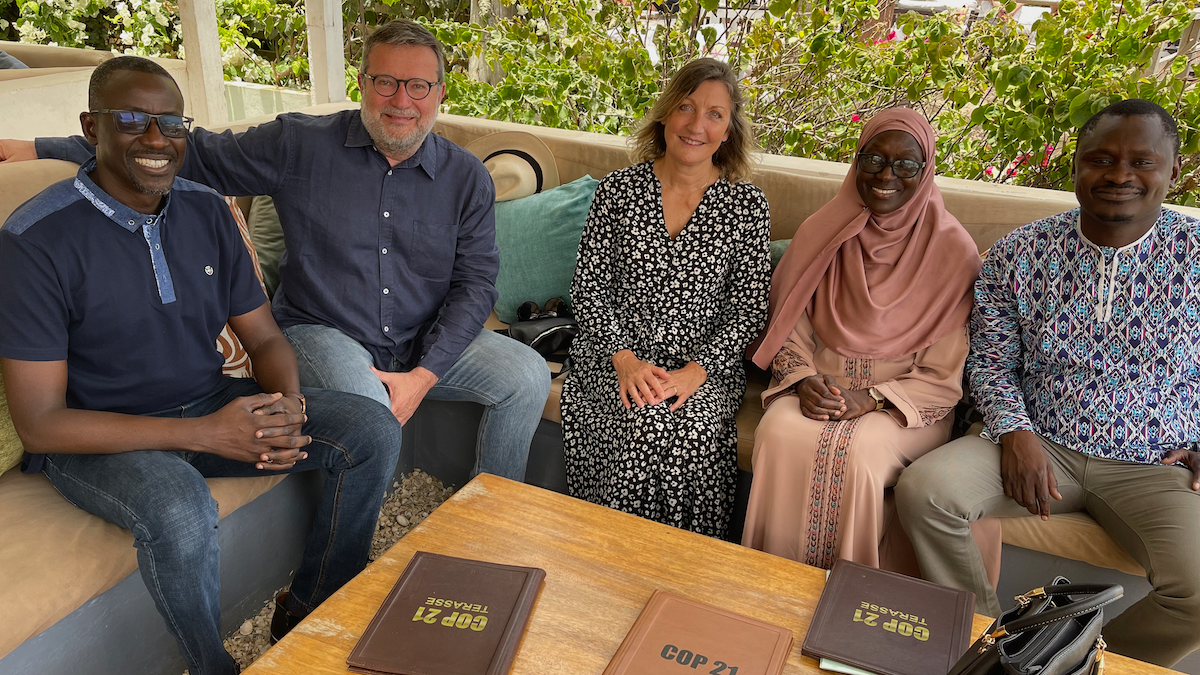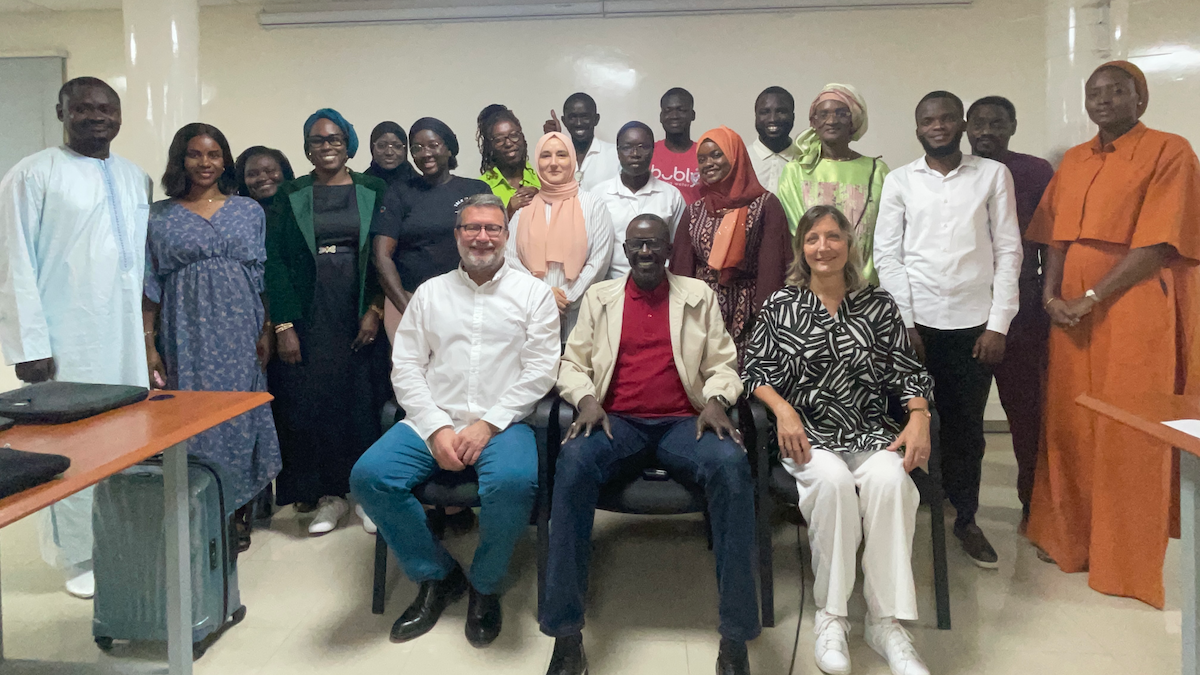A Historic Milestone: Clinical EFT Officially Enters Medical Education in Africa
In May 2025, a remarkable and unprecedented event occurred: for the very first time, Clinical EFT (Emotional Freedom Techniques) was officially integrated into a Master’s program in psychotherapy within a faculty of medicine in Africa — at Cheikh Anta Diop University in Dakar, Senegal.
This milestone marks a turning point in the global history of tapping-based therapies. It ushers in a new era where energy psychology methods such as EFT are now institutionally recognized not only as complementary approaches, but also as potentially foundational tools for mental health care in low-resource contexts.
Contributors: Prof. Papa Lamine Faye, Prof. Jean Augustin Diégane Tine, Agnès Bévierre

From left to right : Pr Papa Lamine Faye, Jean-Michel Gurret, Agnès Bévierre, Madeleine Thiaw, Jean-Augustin Giégane Thine
Why is this so important?
1. A breakthrough in academic recognition
Until now, EFT has been primarily disseminated through private training organizations and practitioner networks. Its formal inclusion in a university medical curriculum grants EFT unprecedented academic legitimacy in Africa. This is particularly important at a time when trauma-related disorders are on the rise and traditional psychiatric care remains centralized and difficult to access.
According to Prof. Papa Lamine Faye, psychiatrist and director of the Institute for Research and Teaching in Psychopathology at the University of Dakar: “Most of our psychiatric training is focused on diagnosis and prescription. Psychotherapy has often been overlooked, except for training in family and systemic therapy. Introducing a tool like EFT — simple, effective, and culturally adaptable — fills a gap that medical training alone cannot address.”
2. A context where EFT truly makes sense
Senegal, like many sub-Saharan African countries, is facing a mental health crisis, exacerbated by migration-related trauma, economic stress, domestic violence, and lack of access to care. Compounding this, the stigma around psychiatry remains strong.
What makes EFT particularly suitable in this context?
👐 It requires no equipment — just one’s hands.
⏱️ It provides rapid symptom relief, often in a single session.
🧘 It aligns with African somatic expressions of distress, where emotional suffering is frequently experienced and expressed through the body.
🤝 It promotes autonomy by allowing individuals to use the technique on their own after training.
“EFT resonates with our culture,” says Prof. Faye. “In Senegal, people live and feel through the body. Tapping allows them to reconnect with their sensations and naturally regulate their distress.”

The first cohort: feedback from psychiatrists and trainees
This first training, co-facilitated by Jean-Michel Gurret and Agnès Bévierre, brought together 18 professionals enrolled in the new university Master’s in Psychotherapy program. Most were psychiatrists, clinical psychologists, and advanced trainees.
The feedback was overwhelmingly positive.
“Many participants experienced personal relief during the first sessions,” reports Agnès Bévierre. “They quickly understood the power of the method — not only intellectually, but also emotionally and somatically.”
These early adopters are now positioned to become the first local trainers and ambassadors of EFT in Senegal and West Africa.
The role of visionary leaders
This advancement would not have been possible without the vision and commitment of several key figures:
- Prof. Jean Augustin Diégane Tine, Head of the Mental Health Division at the Senegalese Ministry of Health. He advocates for the integration of mental health into primary care and has publicly supported EFT as a low-cost, scalable, and community-accessible method.
- Prof. Papa Lamine Faye, Full Professor of Psychiatry and leading figure in neurotherapy-based trauma care in Senegal, promotes body-inclusive psychotherapies.
- Jean-Michel Gurret, founder of IFPEC (France), has long supported the integration of Clinical EFT into healthcare systems and is now helping to build training capacity across Francophone Africa.
- Agnès Bévierre, EFT expert, plays a key role in training and mentoring the next generation of practitioners.
What’s next? The future of EFT in Africa
This pilot project in Dakar is only the beginning.
Next steps include:
- Expanding EFT training to nurses, social workers, and community health agents, particularly in underserved rural areas.
Establishing a national mentorship system to support trained practitioners in clinical implementation.
- Developing a national research program on EFT, adapted to African contexts, to produce scientific data and encourage integration into public health policies.
- Creating partnerships with ministries, universities, and NGOs to fund, disseminate, and sustain the model.
“The goal,” says Prof. Tine, “is to make EFT a recognized tool within national health strategies — not as a luxury, but as a necessity.”
Conclusion: A New Chapter for the Global Tapping/EFT Movement
The integration of Clinical EFT into the academic and clinical infrastructure of a major African university is not only historic — it is filled with hope.
It represents a model for how energy psychology can meet public health challenges in a way that is innovative, culturally relevant, and economically sustainable.
As this Senegalese initiative gains momentum, it may very well inspire similar integrations across Africa and the Global South, where the need for scalable mental health solutions is most urgent.
If you are an EFT or TFT researcher, practitioner, or trainer, now is the time to connect, support, and learn from what is unfolding in Dakar.
Africa is not catching up — it is leading.
Editor’s Note: In some other African countries, energy psychology approaches based on tapping have been instrumental in facilitating trauma healing. For example, Thought Field Therapy (TFT), has been widely used in Rwanda: in schools, in communities where community leaders have been trained in the method, and in jails. Since 2006, hundreds of thousands of genocide survivors have been treated using this method. EFT has also been widely used in Rwanda. The Trauma Tapping Technique (TTT) has helped child soldiers in the Congo heal and has also been used in Rwanda and Uganda.
Authors
Professor Papa Lamine Faye is a leading figure in contemporary African psychiatry. A Distinguished Full Professor at Cheikh Anta Diop University (UCAD) in Dakar, he currently heads the Institute for Research and Teaching in Psychopathology, a flagship institution in the training of mental health and psychotrauma professionals. A seasoned clinician, he practices at Fann University Hospital Center, with recognized expertise in transcultural psychiatry, trauma-related disorders, migration, occupational mental health, and geriatric psychiatry. Author of over 45 scientific publications, his research bridges Western psychiatric models with African sociocultural realities.
Jean-Michel Gurret is a licensed psychotherapist, and the leading French-speaking expert in Clinical EFT (Emotional Freedom Techniques). Based in private practice in Saint-Quentin, France, he has over 20 years of experience working with individuals suffering from simple and complex trauma, PTSD, anxiety disorders, and chronic pain. He teaches Clinical EFT and energy psychology in several prominent French universities, including the University of Lorraine (Metz), the Faculty of Medicine of Lyon-Est, and the University of Lille. He is author of over fifteen books, and has contributed to several peer-reviewed scientific studies on EFT, including research conducted in humanitarian settings such as Haiti.
Professor Jean Augustin Diégane Tine is a leading figure in mental health in Senegal. A psychiatrist and epidemiologist, he holds several key positions in the public health sector. He is an Associate Professor of Public Health at the Faculty of Medicine, Pharmacy, and Dentistry of Cheikh Anta Diop University in Dakar, where he teaches and conducts research, He heads the Mental Health Division within the Ministry of Health and Social Action of Senegal, playing a central role in the development and implementation of national mental health policies. He is also Director of Research at the Institute for Research in Epidemiology and Public Health.



